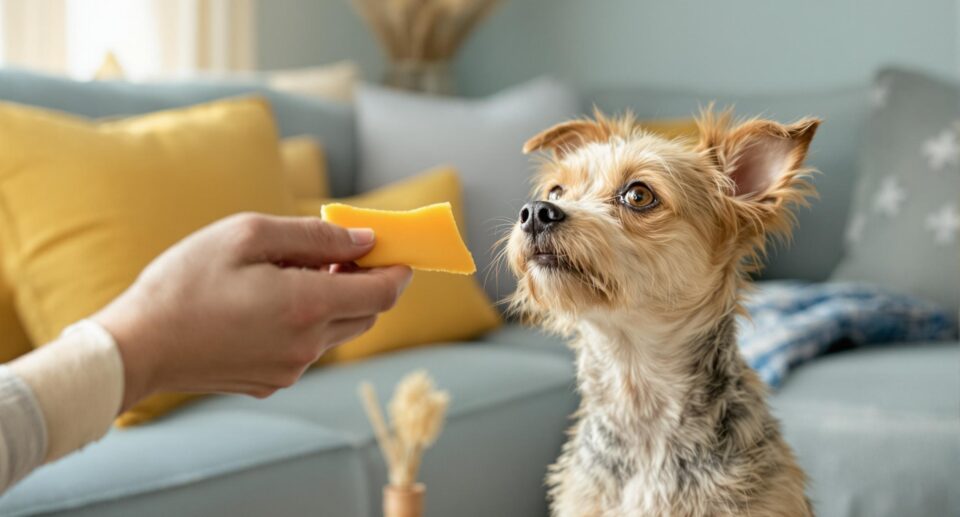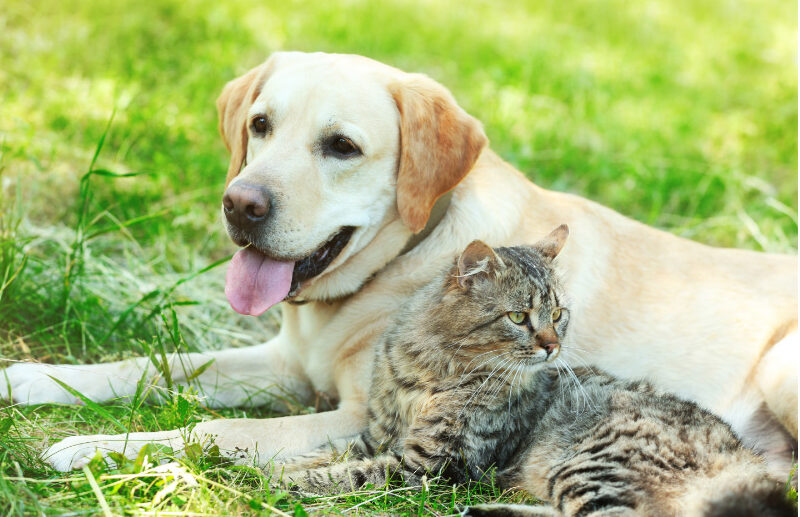Can Dogs Eat Cheese?

As dog parents, we want the best for our pups and would never want to harm them or intentionally give them food that isn’t good for them. That’s why it’s important to research which foods are safe to give to dogs because while some foods are safe and healthy for humans to consume, it doesn’t mean that they are safe and healthy for dogs to consume.
Most dogs, if not all, love cheese and would happily eat it, given the opportunity. When used in moderation, cheese can be a great treat for dogs, whether if it’s used for training purposes or disguising medications (not antibiotics). However, because of the dairy content, cheese might not be a safe treat option for all dogs.
Believe it or not, it’s possible for dogs to be lactose intolerant, meaning their bodies lack the ability to digest the lactose in dairy products, like cheese. Like humans, a dog’s intolerance to lactose can be mild or severe. If you’re unsure whether your dog is lactose intolerant, it’s best to test it out with a small amount of cheese first. If your dog doesn’t show any signs of stomach upset or discomfort from small amounts of cheese, then they’re clear to eat some cheese as a treat. If they suddenly get gas or diarrhea after eating cheese, it’s likely your dog is lactose intolerant and shouldn’t eat any more cheese.
Benefits of cheese
If your dog can tolerate cheese, it can have many health benefits for them. Cheese is rich in:
- Protein
- Calcium
- Vitamin A
- Essential fatty acids
- B-Complex vitamins
What to watch out for
Most cheeses are safe for dogs to eat. However, keep your dog away from blue cheese. When blue cheese starts to get super ripe, the fungi within it produce a substance, roquefortine C, which many dogs are sensitive to.
Since cheeses are made with human taste buds in mind, they likely contain high amounts of sodium. Before giving your pet cheese, take a peek at the sodium content in the cheese. Too much sodium can cause high blood pressure in dogs. Cheese is also high in fat, which can be a problem for overweight dogs if given in excess. Additionally, try and stick to plain cheese. Cheeses that have added ingredients like onion, garlic, or herbs can be harmful to your dog.
Your four-legged family members come running when they hear the crinkle of a cheese wrapper. But is it really okay to share a few shreds of mozzarella with your cat, or slip your dog a cube of cheddar off the cutting board?
Why Cheese Is A Good “Sometimes” Snack
You may have heard that dogs and cats are lactose intolerant. It’s true! As puppies and kittens, our pets produce the enzyme lactase to help them digest the lactose in their mother’s milk. Once they’re weaned, though, they will no longer produce as much lactase, making it more difficult for them to digest dairy.
Like many humans, your pets may be sensitive to dairy products, and may suffer from diarrhea a few hours after eating them. For most pets, though, a nibble of cheese is unlikely to set off digestive upset.
Given in moderation, cheese can be a great training aid. With its potent taste and aroma, most pets are happy to roll over for it. It’s best to reserve small tidbits of cheese for teaching important skills like recall. Your “gouda” boy or girl is sure to come running, even amongst distractions, for a chance to earn a bite of provolone.
Cheese is also great for disguising medications, as it can be molded around most meds, it masks the bitter taste and smell, and most pets gobble it up without a second thought. However, if your pet needs medication on a long-term daily basis, you’re better off using Zoe’s Pill Pops or Greenies Pill Pockets.
The Best Cheeses For Pets
Some cheeses are more pet-friendly than others. Hard, aged cheeses like cheddar and parmesan are low in lactose, while soft cheeses and spreads like cream cheese are higher in the natural sugar. When it comes to lactose-laden cheeses like cottage, mozzarella, and cream cheese, limit your pet’s serving size to a small taste.
Also, be conscious of salt and saturated fat content in some cheeses. Not only can high-fat cheeses promote weight gain, they can also put your pet at risk for pancreatitis. Even one especially fatty meal can overwork the pancreas, causing it to become painfully inflamed. So, it’s never a good idea to give your pet a considerable serving of cheese, even as a one-time special treat.
There are many pet products specially made for your four-legged cheese connoisseur. Your dog may enjoy snacking on Himalayan Dog Chews, a low-fat, long-lasting treat. Also consider Blue Buffalo Bacon, Egg, and Cheese flavored Health Bars, a great source of protein, fiber, and beneficial omega-3 fatty acids.





